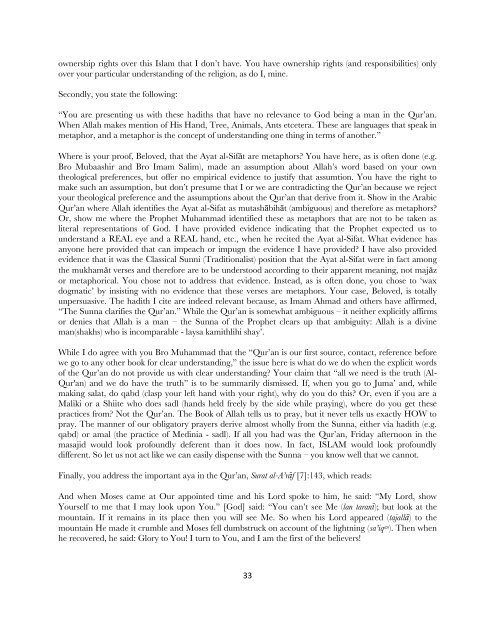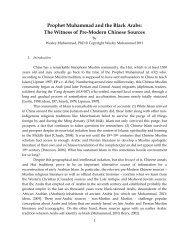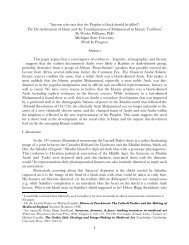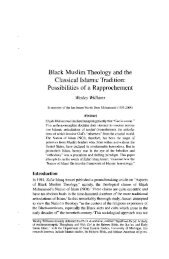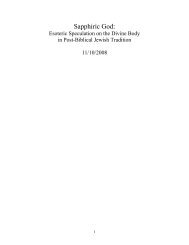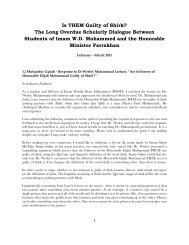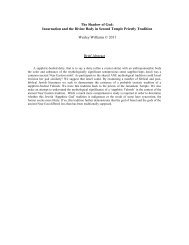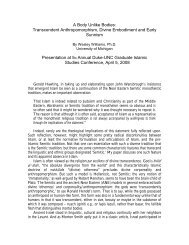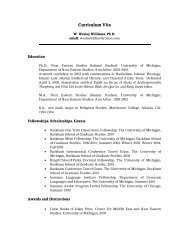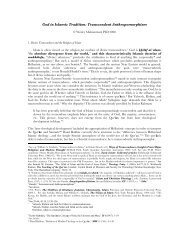Is THEM Guilty of Shirk? - Dr. Wesley Muhammad
Is THEM Guilty of Shirk? - Dr. Wesley Muhammad
Is THEM Guilty of Shirk? - Dr. Wesley Muhammad
Create successful ePaper yourself
Turn your PDF publications into a flip-book with our unique Google optimized e-Paper software.
ownership rights over this <strong>Is</strong>lam that I don‘t have. You have ownership rights (and responsibilities) only<br />
over your particular understanding <strong>of</strong> the religion, as do I, mine.<br />
Secondly, you state the following:<br />
―You are presenting us with these hadiths that have no relevance to God being a man in the Qur‘an.<br />
When Allah makes mention <strong>of</strong> His Hand, Tree, Animals, Ants etcetera. These are languages that speak in<br />
metaphor, and a metaphor is the concept <strong>of</strong> understanding one thing in terms <strong>of</strong> another.‖<br />
Where is your pro<strong>of</strong>, Beloved, that the Ayat al-Sifāt are metaphors? You have here, as is <strong>of</strong>ten done (e.g.<br />
Bro Mubaashir and Bro Imam Salim), made an assumption about Allah‘s word based on your own<br />
theological preferences, but <strong>of</strong>fer no empirical evidence to justify that assumtion. You have the right to<br />
make such an assumption, but don‘t presume that I or we are contradicting the Qur‘an because we reject<br />
your theological preference and the assumptions about the Qur‘an that derive from it. Show in the Arabic<br />
Qur‘an where Allah identifies the Ayat al-Sifat as mutashābihāt (ambiguous) and therefore as metaphors?<br />
Or, show me where the Prophet <strong>Muhammad</strong> identified these as metaphors that are not to be taken as<br />
literal representations <strong>of</strong> God. I have provided evidence indicating that the Prophet expected us to<br />
understand a REAL eye and a REAL hand, etc., when he recited the Ayat al-Sifat. What evidence has<br />
anyone here provided that can impeach or impugn the evidence I have provided? I have also provided<br />
evidence that it was the Classical Sunni (Traditionalist) position that the Ayat al-Sifat were in fact among<br />
the mukhamāt verses and therefore are to be understood according to their apparent meaning, not majāz<br />
or metaphorical. You chose not to address that evidence. Instead, as is <strong>of</strong>ten done, you chose to ‗wax<br />
dogmatic‘ by insisting with no evidence that these verses are metaphors. Your case, Beloved, is totally<br />
unpersuasive. The hadith I cite are indeed relevant because, as Imam Ahmad and others have affirmed,<br />
―The Sunna clarifies the Qur‘an.‖ While the Qur‘an is somewhat ambiguous – it neither explicitly affirms<br />
or denies that Allah is a man – the Sunna <strong>of</strong> the Prophet clears up that ambiguity: Allah is a divine<br />
man(shakhs) who is incomparable - laysa kamithlihi shay‘.<br />
While I do agree with you Bro <strong>Muhammad</strong> that the ―Qur‘an is our first source, contact, reference before<br />
we go to any other book for clear understanding,‖ the issue here is what do we do when the explicit words<br />
<strong>of</strong> the Qur‘an do not provide us with clear understanding? Your claim that ―all we need is the truth (Al-<br />
Qur'an) and we do have the truth‖ is to be summarily dismissed. If, when you go to Juma‘ and, while<br />
making salat, do qabd (clasp your left hand with your right), why do you do this? Or, even if you are a<br />
Maliki or a Shiite who does sadl (hands held freely by the side while praying), where do you get these<br />
practices from? Not the Qur‘an. The Book <strong>of</strong> Allah tells us to pray, but it never tells us exactly HOW to<br />
pray. The manner <strong>of</strong> our obligatory prayers derive almost wholly from the Sunna, either via hadith (e.g.<br />
qabd) or amal (the practice <strong>of</strong> Medinia - sadl). If all you had was the Qur‘an, Friday afternoon in the<br />
masajid would look pr<strong>of</strong>oundly deferent than it does now. In fact, ISLAM would look pr<strong>of</strong>oundly<br />
different. So let us not act like we can easily dispense with the Sunna – you know well that we cannot.<br />
Finally, you address the important aya in the Qur‘an, Surat al-A‟rāf [7]:143, which reads:<br />
And when Moses came at Our appointed time and his Lord spoke to him, he said: ―My Lord, show<br />
Yourself to me that I may look upon You.‖ [God] said: ―You can‘t see Me (lan taranī); but look at the<br />
mountain. If it remains in its place then you will see Me. So when his Lord appeared (tajallā) to the<br />
mountain He made it crumble and Moses fell dumbstruck on account <strong>of</strong> the lightning (sa‟iq an). Then when<br />
he recovered, he said: Glory to You! I turn to You, and I am the first <strong>of</strong> the believers!<br />
33


